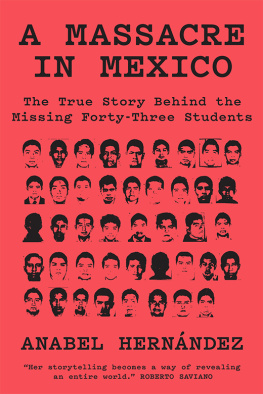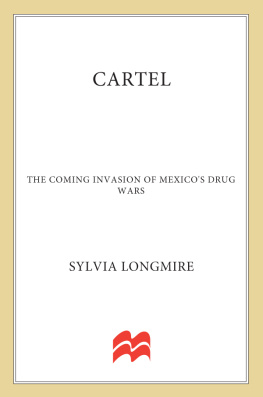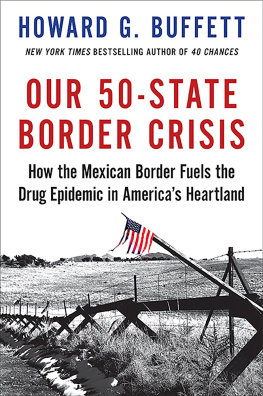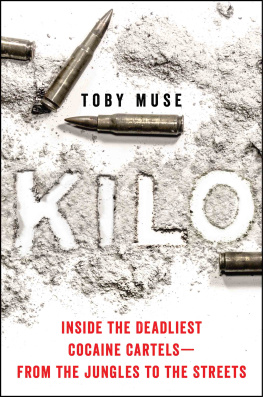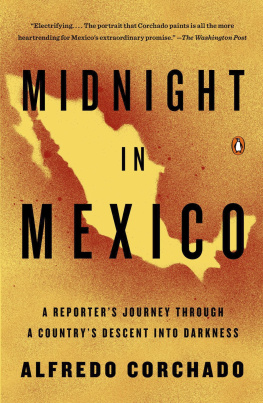This English-language edition published by Verso 2013
Translation Iain Bruce 2013
First published as Los seores del narco
Grijalbo 2010
Foreword Roberto Saviano 2013
Foreword translation Paolo Mossetti 2013
All rights reserved
The moral rights of the authors have been asserted
Verso
UK: 6 Meard Street, London W1F 0EG
US: 20 Jay Street, Suite 1010, Brooklyn, NY 11201
www.versobooks.com
Verso is the imprint of New Left Books
eISBN: 978-1-78168-248-7
British Library Cataloguing in Publication Data
A catalogue record for this book is available from the British Library
Library of Congress Cataloging-in-Publication Data
Hernndez, Anabel.
[Seores del narco. English]
Narcoland : the Mexican drug lords and their godfathers / Anabel Hernandez;
foreword by Roberto Saviano; translated by Iain Bruce.
pages cm
1. Drug trafficMexico. 2. Organized crimeMexico. 3. Drug controlMexico. 4.
CorruptionMexico. I. Title.
HV 5840. M 4 H 4713 2013
363.450972dc23
2013011559
v3.1
To all the sources who shared with me
a wealth of knowledge, testimonies and documents,
despite the risks involved. Today some of their
names feature in the appalling catalog of
the executed and the disappeared of Mexico.
To Hctor, my children, my family,
and my friends, for their boundless understanding
while I carried out this investigation.
Contents
Foreword
by Roberto Saviano
A nabel Hernndezs Narcoland is essential for understanding the power dynamics inside the Mexican economythe economys deep, often concealed, links with politics. This is a book that exposes how everything in Mexico is implicated in the narco system. And yet, Anabels work is hard to describe. She doesnt just write about drug trafficking or drugs or Mexico. Her storytelling becomes a method of revealing an entire world.
Anabels writing has a scientific, clear, rigorous, almost martial rhythm. She does not give in to lazy descriptions, nor does she give in to anger or disgust. She is a journalist who never loses focus on the mechanisms of power. Her method makes her a rarity in Mexico, and because of this, her voice is a precious resource. She wants to know how it was possible that one of the great democracies of America became a narco-democracy. With her investigation of the first government of change of Vicente Fox (which brought an end to seventy years of one-party rule under the Partido Revolucionario Institucional), she showed how that change was fictitious. She was one of the first reporters to talk about economic corruption, long before the crisis exploded, and she did that by tracking seemingly endless political expenditures. She could already see the system becoming a black hole of bribes and payoffs. Hernndez was one of the first to talk openly about El Chapo Guzmn, and one of the first reporters to talk about El Chapos connections to politics. Because of this, she became a target of organized crime and now lives a life filled with danger.
Anabel was threatened in a way that might seem bizarre to those unfamiliar with political intimidation. The secretary of public security in Mexico, Genaro Garca Luna, declared that Anabel had refused protection. Actually, she had never received any protection offers from the state, nor had she refused them. So the message was ominous and clear. What they were saying was: We could protect you, we could grant you this protection, but not to defend your words: rather, only if you stop writing. And this invitation wont come again. Anabel, when put in this corner, demonstrated her courage by saying she didnt want to die.
The role of the journalist is often a difficult one. Journalists often hate each other, or envy each other. This is perhaps one of the jobs in which these feelings are most common, and it can lead to isolation. It happened to Anna Politkovskaya after she said she was poisoned while on a flight. Many journalists accused Anna of having made it up, saying that she had become a sort of delirious writer who believed in 007-style poisonings. The honesty of her words became apparent when she was murdered. Anabel said: I want to live. I do not want to be murdered. I dont want my name to be added to the list of reporters killed every year in Mexico. And this is courage. The strong, profound courage that I have always admired.
Narcoland is not only an essential book for anyone willing to look squarely at organized crime today. Narcoland also shows how contemporary capitalism is in no position to renounce the mafia. Because it is not the mafia that has transformed itself into a modern capitalist enterpriseit is capitalism that has transformed itself into a mafia. The rules of drug trafficking that Anabel Hernndez describes are also the rules of capitalism. What I appreciate in Anabel is not only her courageit is this comprehensive view of society that is so rare to find.
The value of Anabels work is also, perhaps above all, scientific. She managed to get information that had been held by the CIA. She was the first to collate police investigations in several different countries, and she did that by making use of her inheritance: the stories of journalists who came before her. One example is the case of journalist Manuel Buenda Tellezgirn, who had collected information on the relationship between the CIA and the narcos of Veracruz. He got this information from the Mexican secret service and paid for it with his life.
Anabel also had the courage to ask questions about politicians. And to pose these questions does not mean to defame. Her strength was in questioning how it could have been possible for politics to become so powerless or corrupt, justice so incompetent or reluctant. In a situation like this, asking questions becomes an instrument of freedom. A hypothesis can give us insight into the meaning of clues and force politicians to give answers. When those answers are not given, when politicians do not deny allegations by providing evidence, one can justly suspect their complicity. In the case, for example, of the escape of El Chapo Guzmn, Anabel proved the official version to be false while giving a political interpretation of it: politicians may have released El Chapo because it was convenient for them to do so. In a country like Mexico, which has a deeply compromised democracy, reporters proposing interpretations like these are acting to save their democracy. It is an attempt to bring responsibility back into politics. While nailing politicians to their responsibilities, Anabel transforms her pages into an instrument for readersan instrument of democracy.
Narcoland describes a disastrous war on drugs that has led to more than 80,000 deaths since its inception in 2006. A war that has been nothing more than a blood battle between feuding fiefdoms. A war between one, often corrupt, part of the state against another corrupt part of the state. Hence the war on drugs has not been a war on criminal cartels, nor did it weaken the strength of the cartels. On the contrary, it boosted it. The war redistributed money, weapons, and repressionand eventually provoked counterattacks. Counterattacks by a government itself infiltrated by criminal organizations. Add to this the disastrous policies of the United States, which for years has claimed to be challenging drug trafficking in Mexico, with no positive results.
Anabel recounts all of this with the detachment of an analyst, but the pages themselves exude tragedy and drama. The drama of those who know that if things keep going this way, democracy itself will be destroyed, crushed. Anabel Hernndez sketches a map for her readers, so they can navigate the state of things today. This is a map for all those who understand that the current economic crisis is not only the result of financial speculation without regulations, but also a total impunity for limitless greed. Anabel describes the geography of a world in which political economy has become criminal economy.


